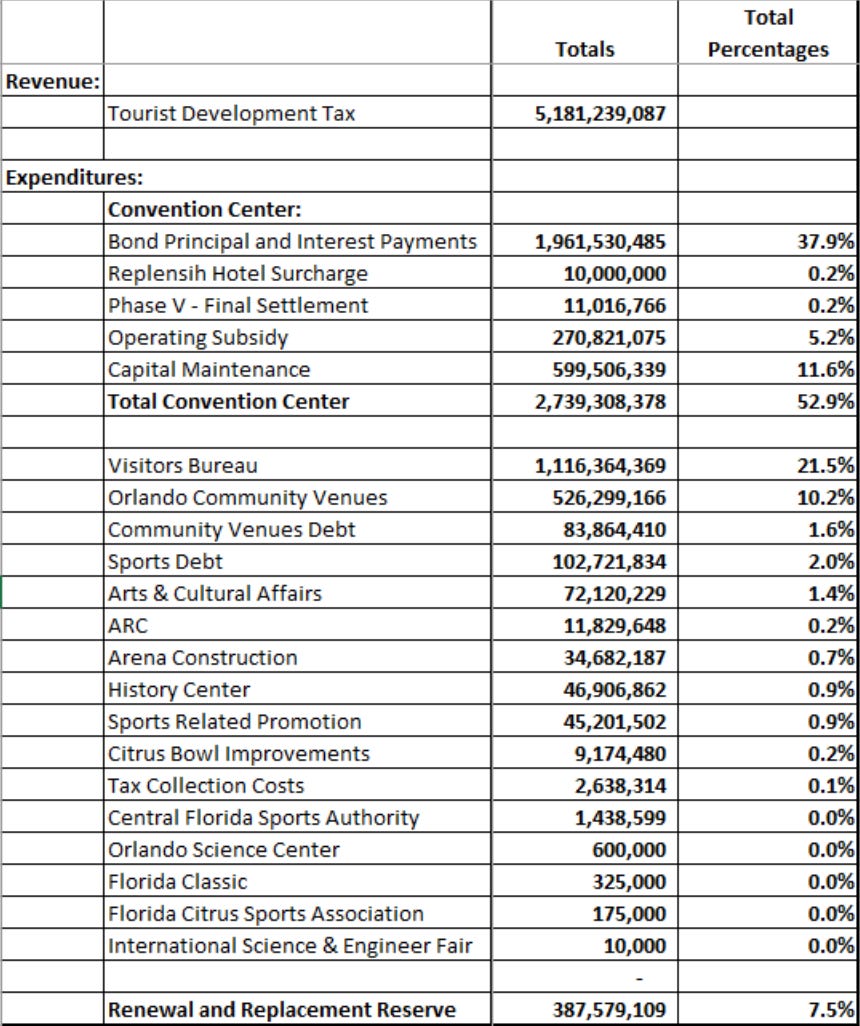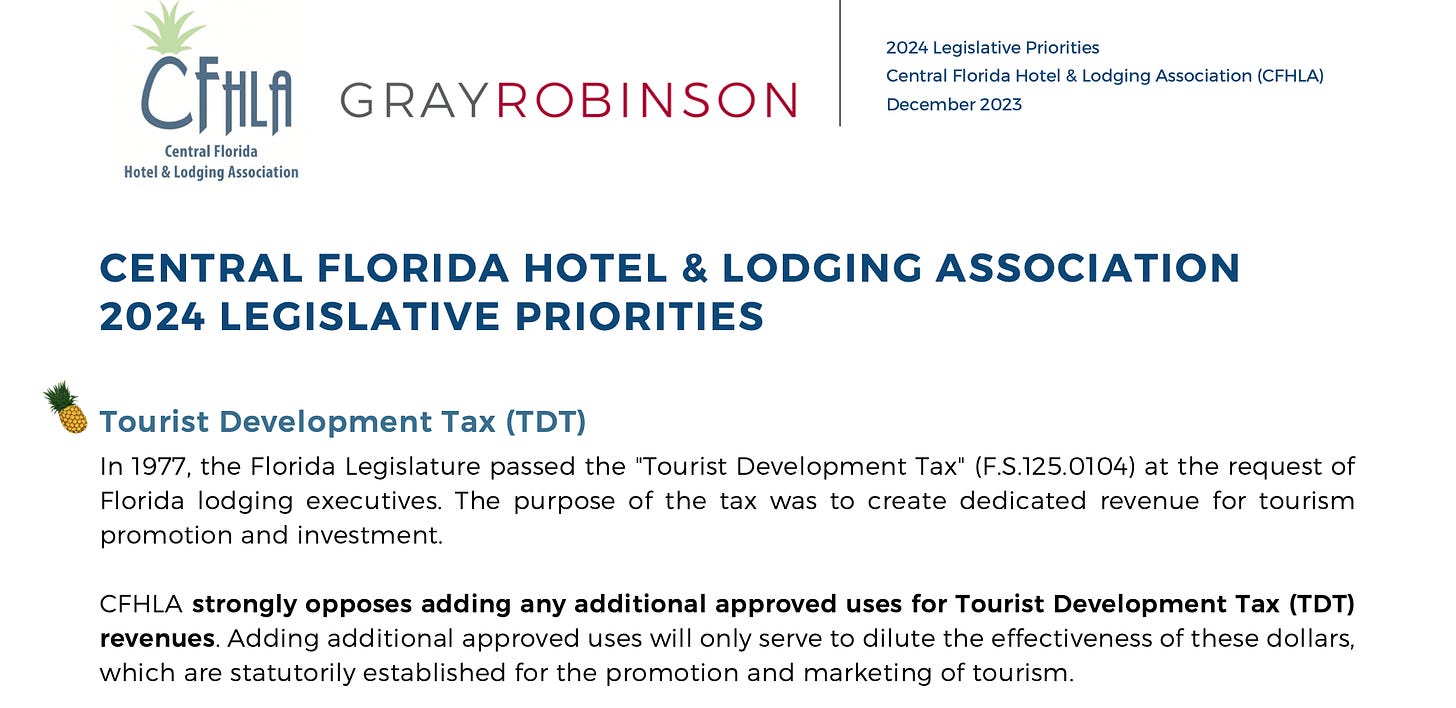Voters in Orlando have a chance to loosen the tourism industry's grip on taxpayer money
Three key county races in central Florida could shape whether Orlando will ever stop dumping hotel taxes into tourism and sports — and start spending the money on real needs like transit and housing.

This is Seeking Rents, a newsletter and podcast devoted to producing original journalism — and lifting up the work of others — about Florida politics, with an emphasis on the ways that big businesses and other special interests influence public policy in the state. Seeking Rents is written by veteran investigative journalist Jason Garcia, and it is free to all. But please consider a voluntary paid subscription, if you can afford one, to help support our work.
Note: After this story posted, the final candidate responded with her answers. The story has been updated to include them.
Just a few weeks from now, voters across Florida will begin casting ballots for the November general election.
They have a bunch of big decisions to make — from a potentially close U.S. Senate race and a constitutional amendment protecting abortion rights to the fate of the Republican supermajority in Tallahassee and more Moms for Liberty school board candidates.
But there is a unique opportunity in Orlando.
Voters in Orange County — a county of nearly 1.5 million people that reaches from Disney World to the St. Johns River — will decide three closely contested county commission races that will have a profound impact on the region’s future.
Nicole Wilson, an incumbent commissioner, and Austin Arthur, a marketing executive, are competing in District 1, which covers the county’s western suburbs. Mayra Uribe, another incumbent, and Linda Stewart, a term-limited state senator, are squaring off in District 3, which includes neighborhoods south and east of Orlando. And Kelly Semrad, a university professor, and Steve Leary, a former mayor of Winter Park, are vying to represent District 5, which stretches all the way from downtown to the county’s rapidly developing eastern frontier.
That’s basically half of the county commission, which is comprised of six regional commissioners and a countywide mayor. And there are clear contrasts between the candidates in all three races.
For starters, there’s an obvious partisan divide. These races pit Wilson, Uribe and Semrad, all Democrats, against Austin and Leary, who are Republicans, and Stewart, who was elected to the Florida Senate as a Democrat but once in Tallahassee voted with Republicans more often than any other Democrat in the Senate. (That’s according to a quantitative analysis of legislator voting records by The Tributary, a nonprofit newsroom in Jacksonville. If you’d prefer a few qualitative examples, see here, here, here, here, and here.)
But the differences between these three candidates go beyond basic party lines. There’s also a wide gulf — in both record and rhetoric — on two of the most important issues facing local leaders in Orlando: Tourism and sprawl.
I’ve mentioned before that I live in Orlando. It’s been my home for more than 20 years now. So I care about these particular elections a little more than most. And because of that, I’m going to spend a bit of time drilling down into these three races.
That starts today with a story exploring where these candidates stand on hotel taxes, which are an enormous source of money in Orange County — but one that local leaders have historically spent almost entirely on subsidies for the tourism and pro sports industries.
It’s one of the most brazen examples of rent-seeking in all of Florida politics. But it doesn’t have to be this way. This is money that could instead be spent helping everyday people and working families in central Florida — as it is in some other parts of the state already and in other big tourism markets around the country.
We’ll follow up soon with a story specifically about suburban sprawl. But if there are other issues you’d like to see covered in any of these races, leave a comment below or send a note to Garcia.JasonR@gmail.com.
(Update: Read the second story here: Candidates in Orlando split over new rules to save rural land from suburban sprawl)
And if you haven’t already: Make a plan to vote.
Who will take on Big Tourism…
If you’ve ever vacationed in Orlando, you probably noticed a 6 percent tax that got tacked onto your hotel bill. This is known as the “Tourist Development Tax” — although most people call it the hotel tax or the bed tax, because it gets charged on all short-term stays in hotels, motels, and vacation rentals.
As you might imagine, the hotel tax generates lots of money in Orange County, which, as the home of Disney World and Universal Studios, is one of the top travel destinations in the world. The tax generated roughly $360 million last year — basically what it costs to run the entire Orange County Sheriff’s Office.
But Orange County doesn’t spend a dime of that money putting more police on the streets. The county doesn’t spend any of it widening congested roads or expanding bus or rail service. It doesn’t use any of it to build more housing supply.
Instead, Orange County spends almost all of its hotel tax proceeds on subsidies for tourism business and sports billionaires.
Consider this: Orange County has raised a little more than $5 billion in the roughly 45 years since it began charging a hotel tax. Somewhere around 90 percent of that money — 90 cents of every dollar — has gone to three causes: A massive, money-losing convention center built to drive business to hotels and theme parks; tourism advertising; and arenas for the Orlando Magic, the professional basketball team owned by the billionaire DeVos family.
The are two primary reasons for this. The first is that the tourism industry lobbies hard for restrictive state laws that are designed to force counties to burn most of their hotel taxes on tourism and sports.
But the second is that most Orange County politicians have historically refused to challenge the status quo.
I asked all six candidates running for county commission this year two simple questions about this:
Do you believe that counties should have the discretion to spend TDT revenue on local needs — such as parks, police, and transit?
If elected commissioner, do you plan to personally and publicly lobby the state Legislature to give counties full discretion to spend TDT on local needs?
Three commissioners said yes — and they did so without any hesitation or equivocation: Nicole Wilson in District 1, Mayra Uribe in District 3, and Kelly Semrad in District 5.
The other three were different. Steve Leary and Linda Stewart also said yes — but both of them hedged their answers. And Austin Arthur wouldn’t answer directly.
There’s reason for that: Arthur, Stewart and Leary have all aligned their campaigns with the tourism industry. The industry’s main local lobbying group — the Central Florida Hotel & Lodging Association, which is run by hotel and theme park executives — has endorsed all three candidates and given money to each of their campaigns.
And the lodging association’s top priority is to make sure that Orange County politicians keep spending all their hotel taxes on tourism and sports.
Now, I mentioned that Linda Stewart and Steve Leary both hedged their answers.
Stewart said she supports spending hotel taxes on local needs — but only “if it benefits the tourism industry.” That’s an unnecessary and subjective qualifier.
More concerning, Stewart said she wouldn’t even bother lobbying the Legislature for changes. Why? Because as a state senator, she filed bills to spend hotel taxes on incentives for movie and television productions. The bill never got anywhere because, Stewart said, “there was no appetite for this in Tallahassee.”
Of course, one reason there may have been “no appetite” for that is because tax breaks for movie studios and TV producers are a terrible waste of money.
Leary also said he thinks counties should be able to spend hotel taxes on local needs. But he added that he would personally lobby for changes, too.
But then Leary also said that “it is vital to collaborate with the industry” on new ways to spend hotel taxes — an industry that, remember, “strongly opposes any addtional” uses of the tax.
He also repeated a false talking point that tourism industry lobbyists have been peddling for years.
“I also believe it’s essential to understand that this is a self-imposed tax by hoteliers that has existed since the late 1970s,” Leary said.
To be very clear: Hotel taxes were not self-imposed by hoteliers. This is a fiction invented by an industry that specializes in fantasy.
The hotel tax was imposed by the Florida Legislature. It was imposed because a bunch of business leaders in Daytona Beach and Orlando wanted to build convention centers but knew it would be politically toxic to make their own constituents pay for them. One of those business leaders eventually became speaker of the state House of Representatives and muscled a hotel tax through Tallahassee.
The tourism industry initially opposed this tax. It only cut a deal once it knew it was going to lose.
I also said that Austin Arthur wouldn’t answer these questions directly.
Instead, he argued that this is not a county issue. That’s because the laws that dictate how communities can spend their hotel taxes are controlled by state lawmakers in Tallahassee — not county commissioners in Orlando.
Anyone running for county commission and claiming they want to spend hotel taxes on local needs is misleading voters, he said.
“I refuse to engage in such political games or deceive people for votes,” Austin said. “This is a state legislative issue that they need to address and when they do…I will lead in representing the voices of District as their commissioner.”
This is a common response from Orange County politicians who are desperate to avoid taking a public stance on this issue.
They know that spending hotel taxes on things like police, parks, and transit is popular with the residents whose votes they need to win their campaigns. But they also know it’s unpopular with the tourism bosses whose money they want to fund their campaigns.
So instead of answering, they claim that talk about hotel taxes is nothing more than a distraction because there’s nothing a county commissioner can do about it anyway.
Here’s why that’s not true: Florida lawmakers have changed hotel tax laws many times over the years. But they only do it when a local community demands reform.
This is how counites in the Florida Panhandle won the right to spend some of their hotel taxes on police and public safety. It’s how Brevard County got the power to spend hotel taxes building a train station. And it’s how the Florida Keys just this year won a fight to put $35 million from hotel taxes into affordable housing.
It’s only when local leaders refuse to push for change — when they pretend that they are nothing more than helpless bystanders with no power or agency in this fight — that the status quo remains.
Which is, of course, exactly what the tourism industry wants.
…and stop wasting money in the meantime
County commissioners can do a lot more than lobby for hotel tax changes, too.
They can, for instance, fight to use some of the flexibility they have under current law— which is something that most of Orange County’s tourism-cowed leaders have been unwilling to do in the past.
They can also stop wasting this money in the meantime, by dumping even more into tourism and sports.
And here again, some of these candidates have strong track records.
A year ago, when tourism executives and sports boosters were lobbying county leaders to commit more hotel tax money to an expansion of the convention center and renovations for the Orlando Magic’s arena, Kelly Semrad was the one of the most vocal critics of the plan.
“I ask that our elected officials provide something that helps meet the needs of people carrying our economy (e.g., mass transit),” she wrote in a July 2023 column published in the Orlando Sentinel. “Lobby the state to amend (if needed) the statute that prevents investing in soft infrastructure — our people. I'll be there waiting in a public comment line to speak (or beg) for the people who carry our economy.”
Nicole Wilson was one of just two commissioners who voted against the convention center expansion — a half-billion-dollar boondoggle for an often-empty building that is already bigger than the United States Pentagon.
Uribe voted for the convention center expansion. But Uribe did try to cut back the budget at Visit Orlando, the marketing agency that gets more than $100 million a year in hotel taxes from Orange County. That’s a straight subsidy for businesses like Disney and Universal, which can spend less of their own money on advertising.
But Linda Stewart fought to keep that subsidy in place. In fact, the Orlando Sentinel caught Stewart secretly conspiring with tourism industry lobbyists in Tallahassee on a bill that would have made it much harder for Orange County to trim Visit Orlando’s budget.
The lobbying firm that Stewart worked most closely with had a long list of clients — including Orange County, which subsequently fired the firm because of the conflict of interest. But it also represented the Central Florida Hotel & Lodging Association, which still has the firm on contract.







Hi Jason: Great article! Can you explain "Renewal and Replacement Reserve" in the County Report? Since you know so much about how to dig into these government figures, I would donate more money to your blog for helping us citizens/voters understand the Comprehensive Annual Financial Report (CAFR) put out by Orange County (and every government entity in the country). If we don't understand the money flows, we can't control them or use them for our benefit. By understanding the way the money is spent, we understand the priorities and where the vested interests put pressure on the system in their rent-seeking. We could also make better arguments for change based on financial data and not ideology.
If you live in Orange County and have voted for Linda Stewart in the past, you need to have your head examined. She is more Republican than Democrat because Republicans are paying her more. I believe she voted against the Heat and Safety Act another Heritage Foundation anti worker bill written and produced by them. So voters, look out for her. We just need people who are determined to stop the status quo and get that money back to the county and who we hope will spend it on the items lacking funding right now.